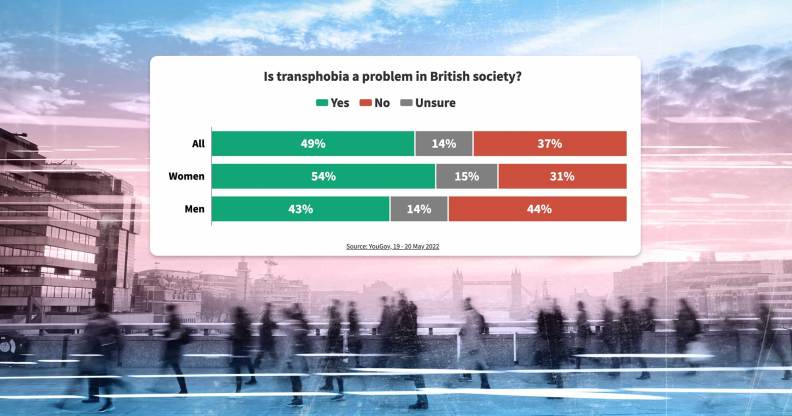Cis men are driving Britain’s anti-trans hostility – the data proves it

Men, not women, are more likely to hold anti-trans views in the UK. (Getty/PinkNews)
With politicians from both major UK parties pitting trans rights against women’s rights, data journalist Ell Folan reveals that it’s cis men, not women, who are fuelling anti-trans sentiment.
It’s become common for politicians to act as if transgender rights and women’s rights are inherently contradictory and conflicting.
Prime minister Rishi Sunak blocked Scotland’s gender reform law citing “potential concerns around safety of women”, while Labour’s Anneliese Dodds has ruled out self-ID for trans people and vowed to “defend” single-sex spaces.
But, research shows that when they take these positions, Britain’s political class are not actually speaking for women. Far from seeing transgender rights as encroaching on their own, most British women in fact favour rights for trans and non-binary – it’s men who are the most vocal and determined in opposing them.
The extent to which men embrace anti-trans rhetoric, and women do not, is evident even from the most general of polling questions.
In May, YouGov asked whether transphobia is or is not a problem in Britain.
Forty-four per cent of men said it isn’t a problem, with 43 per cent saying it is, whereas 54 per cent of women believe there is a very real problem, with 31 per cent disagreeing.
This is an unusual gap in attitudes between genders. Other policy questions do not elicit such a dramatic divide between men and women. For example, one recent survey showed that 81 per cent of men and 77 per cent of women support raising the tax-free allowance to £20,000.
This gender gap on the issue of trans rights also applies to specific policies that would benefit trans people, ranging from documentation to healthcare and education.
When YouGov asked if trans people should be allowed to change their gender on official documents (such as passports and driving licences), 43 per cent of voters in general said yes. But this was driven mainly by women: 45 per cent said yes (to 35 per cent who said no), while 43 per cent of men said no (to 40 per cent who said yes).
One of the main arguments made by Labour and the Conservatives around blocking self-ID for trans people is their desire to “defend” single-sex spaces for women.
But, when asked, 45 per cent of women said trans women should be able to use female toilets but almost half of the men surveyed opposed the idea. When it came to refuges, 45 per cent of women had no trouble with the suggestion but 43 per cent of men did.
The data suggests that despite politicians constantly citing “concerns” from women about trans people, it is in fact cisgender men who are insistent upon the desire to regulate and control access to women’s spaces.
Women are also more favourable towards trans rights when it comes to healthcare, a key area of public life where transgender people are consistently failed by the state.
When asked if the NHS should fund hormone treatment, Brits narrowly said no – but that’s solely because of overwhelming opposition among men (49 per cent no, 31 per cent yes). Women respondents, by contrast, say the NHS should fund trans healthcare (by 44 per cent to 33 per cent). The same split can be found on the question of whether the NHS should fund gender-affirming surgery – men oppose it by a large margin, women support the idea.
One policy around trans rights that has attracted a great deal of controversy is Sunak’s attempted ban on social transition in school, a policy that has been likened to Section 28 (a law that banned discussions of LGBT+ issues in schools from 1988 until 2003). Women are actually quite supportive of introducing children to trans identities. When asked if gender identity and trans identities should be taught to schoolchildren, women say yes by 56 per cent to 30 per cent, while men are almost evenly split (45 per cent yes, 43 per cent no).
It’s also worth noting that when asked if greater recognition and rights for trans people poses a “genuine risk” to women’s rights, 38 per cent of women respondents said no while a third thought it did. Again, it was men who insisted that there is a danger, with 39 per cent saying yes, (to 28 per cent replying no).
What, then, can we learn from all this? For one thing, there absolutely is a strong current of anti-trans sentiment in public opinion. But, notably, women are not the vocal ones.
It is in fact men who hold on to transphobic views, and men who are firm in believing that trans women should be kept out of women’s spaces – even as women themselves are fine with the idea.
Often, politicians who oppose trans rights will say they are merely expressing women’s concerns. What this data proves is that they aren’t speaking for women at all – they’re speaking for cis men.
Ell Folan runs the Stats for Lefties blog and Twitter account.

